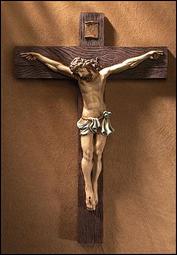
When a Christian asks a Jew, "Do you believe in Christ?" it's like the moon is about to crash with the earth. When these two different views are compared side by side, the Christian perspective of Christ is quite different to the Jewish perspective of Messiah. To add, the Jewish perspective of the Christian Christ is insulting to the Christian faithful while Christians remained baffled with the Jewish perspective of Messiah.
Christians really don't define Christ. To define Christ, they feel as if though they're excluding the topic of many doctrinal foundations that has developed within the course of recent human history, especially the Protestant Reformation. Jews, on the other hand, do define Messiah and do not have a problem talking about a very Jewish one.
Christians really don't define Christ. To define Christ, they feel as if though they're excluding the topic of many doctrinal foundations that has developed within the course of recent human history, especially the Protestant Reformation. Jews, on the other hand, do define Messiah and do not have a problem talking about a very Jewish one.
At the end of the conversation, is it Christ or Messiah? More importantly, what's the difference? Though both groups use similar terms, these words mean totally different things! Could there ever be a resolve to the existing difference? Only if both groups hold true to the same definition, and both sides are not willing to give up the grasp on their views so easily.
See The difference?
Among Jews Among Jews, Messiah (variant for Moshiach משיח) is "the name or title of the ideal king" (Jewish Encyclopedia 1906). Many may reason that Jews do not believe in Messiah, but this is untrue. The Jewish Encyclopedia explains, Not until after the fall of the Maccabean dynasty, when the despotic government of Herod the Great and his family, and the increasing tyranny of the Roman empire had made their condition ever more unbearable, did the Jews seek refuge in the hope of a personal Messiah. They yearned for the promised deliverer of the house of David, who would free them from the yoke of the hated foreign usurper, would put an end to the impious Roman rule, and would establish His own reign of peace and justice in its place. In this way their hopes became gradually centered in the Messiah. (Jewish Encyclopedia 1906) When speaking about Messiah, Rabbi Simmons explains, The messiah will be a regular human being, born naturally to husband and wife. He is not to be a god, nor a man born of supernatural or virgin birth. The very idea that God would take on human form is repulsive to Jews because it contradicts our concept of G-d as being above and beyond the limitations of the human body and situation. Jews believe that G-d ALONE is to be worshipped, and not a being who is His creation, be he angel, saint, or even the messiah himself. (Simmons 2013) Rabbi Simmons also explained the four things that Messiah is expected to accomplish: 1) Build the Third Temple (Ezekiel 37:26-28). 2) Gather all Jews back to the land of Israel (Isaiah 43:5-6). 3) Usher in an era of world peace, and end all hatred, oppression, suffering and disease. As it says: "Nation shall not lift up sword against nation, neither shall man learn war anymore." (Isaiah 2:4) 4) Spread universal knowledge of Israel's Elohim, which will unite humanity as one. As it says: "Elohim will be King over all the world -- on that day, Elohim will be One and His Name will be One" (Zechariah 14:9). In short, Messiah is a person unctioned with the holy oil, a descendent of the household of King David and ruler over the Israeli people. Bibliography 1. "JewishEncyclopedia.com." MESSIAH - JewishEncyclopedia.Com, n.d. Web. 03 Dec. 2013. 2. Simmons, Shraga, Rabbi. "Jewish View of the Messiah- Mashiach." Ask.com. Ed. Aryeh Kaplan, Rabbi. N.p., n.d. Web. 03 Dec. 2013. | Among Christians Among Christians, it’s quite difficult to define the term Christ, because they believe him to be a culmination of sorts that rise within them; at least, this is the outcome that’s reflected whenever he's researched in Christian Bible references. For example, most Christians believe that Christ is the second person of the triune godhead, G-d the Son, who took the form of a human being in order to die for the sins of the world, rose from the grave on the third day and went to heaven. So whenever a Christian is asked about the meaning of Christ, a whole slew of doctrines rises up within them; however, a simple mental image of Christ crucified does surface within them. The Encyclopedia Britannica explains the reason why this internal conflict exists within the Christian faithful, The Eastern Orthodox Church is formally committed to the Christology (doctrine of Christ) that was defined by the councils of the first eight centuries. [...] The Eastern and Western churches still formally share the tradition of subsequent Christological developments, even though the famous formula of Chalcedon, “one person in two natures,” is given different emphases in the East and the West. The stress on Christ’s identity with the preexistent Son of God, the Logos (Word) of the Gospel According to John, characterizes Orthodox Christology. On Byzantine icons, often depicted around the face of Jesus are the Greek letters ο’ω’ν—the equivalent of the Jewish tetragrammaton YHWH, the name of God in the Old Testament (Hebrew Bible). Jesus is thus always seen in his divine identity. (Encyclopedia Britannica 2013) Any Christian can search the Strong's Concordance of the Bible and discover the origins of the term Christ (Χριστός)(Strong's Concordance of the Bible 2013); however, many Christians feel as if though they're limiting his very nature by defining him solely as Christ, reason that there's a lot of spiritual truths that their finite mind cannot comprehend and would love G-d to give them insight into the matter in order to be a better witness to what they believe. Thus whenever asked about Christ, Christians feel impelled to speak about doctrine with few or no biblical reference. Bibliography 1. Meyendorff, John, Rev. "Christ." Encyclopedia Britannica Online. Encyclopedia Britannica, n.d. Web. 03 Dec. 2013. 2. Strong, James. Blue Letter Bible. BlueletterBible.Com, n.d. Web. 03 Dec. 2013. |
© 2013 Nehr HaOlam Publications
Winslow, New Jersey, USA
All Rights Reserved.
Winslow, New Jersey, USA
All Rights Reserved.
 RSS Feed
RSS Feed